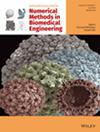Design of Mechanics-Guided Helmet Pad and Its Protection Performance Against the Blast Shock Waves
Abstract
The blast shock waves generated by the explosion are severe threat to soldiers on the battlefield, while the helmets currently equipped for the soldiers cannot offer sufficient blast protection. Some helmet pads have been developed to improve the protection performance of the combat helmets against shock waves. However, it remains unclear how to design the helmet pads to protect the head more effectively against blast shock waves. This study aims to design a new mechanics-guided helmet pad and evaluate its protection performance by numerical simulations. The design of the new helmet pad is guided by the oblique reflection theory (ORT), and the advanced combat helmet (ACH) pad is applied for comparison. The protection performance of the pads against blast waves from two directions (frontal and lateral) was investigated. The differences in the distributions of overpressure inside the helmet using two types of pads were analyzed, and the intracranial pressure (ICP) of head was compared. The ORT-guided pads can reduce the overpressure inside the helmet, minimizing the possibility of blast-induced traumatic brain injury. Furthermore, the underwash phenomenon can also be controlled when the new pads are applied. The results in this study provide an important theoretical basis and some guidelines on the design of helmet pads for the protection of human brain from blast shock waves.

 求助内容:
求助内容: 应助结果提醒方式:
应助结果提醒方式:


